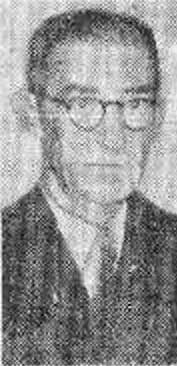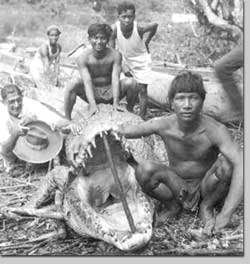| Victim
of Japanese Is Reunited With Brother After 22 Years. William H. AVERY, 62-year-old Borneo rubber grower and former crocodile hunter, who owes his life to the generosity of a felolw [sic] sufferer in a Japanese internment camp, |
|
| was reunited this
week with his brother, David L. AVERY, 196 Young St., Tonawanda, after
a separation of 22 years. The visitor to Tonawanda is plantation superintendent
for the American Chicle Company. He has spent more than 30 years in the
jungles. Still suffering from the torture and starvation diet of four
years in a prison camp in Kuching, Sarawak, Mr. AVERY hasn’t decided whether
to return to Borneo, where the Japs turned his home into a brothel and
destroyed his $114,000 rubber plantation. “The eight-year-old rubber trees
I had planted and nurtured were just ready to be tapped when the Japs
swept in,” he recalled. “They burned my trees for firewood.” Saved By Friend Mr. AVERY’s life was saved, he says, by the kindness of a friend, who fortunately was permitted by the Japs to bring a quantity of clothing into the internment camp. |
 William H Avery |
|
|
|
|
Notes from Eileen: There were two, almost identical, newspaper articles about my great-uncle, William Henry (called Henry) AVERY; b. 4 Oct 1885 Larry's River, Guysborough Co., Nova Scotia (son of Alexander John AVERY & Elizabeth DESLAURIERS), migrated ca 1894 to Cambridge, Massachusetts; m. Ida (Ada?) LAMONT probably in or near Cambridge, Massachusetts. This newspaper article [I transcribed it myself from a clipping with a hand-written date] was published [probably] in Tonawanda, New York, September 14, 1947. The same article [with a few changes] was published in Larry’s River, Nova Scotia. I have only a transcription, not the original clipping. According to the transcription, that paper listed his age as 63 rather than 62. And included this paragraph: Mr. AVERY had a set of luggage made from the hide of a crocodile which he, personally, had killed - this was taken along with his home and contents by the Japs. I have a scan (91kb) of the first article, and a photo showing great-uncle Henry with a group of Borneo natives & a dead crocodile. Eileen Avery
|
|
|
submitted by Eileen Avery
|
|


